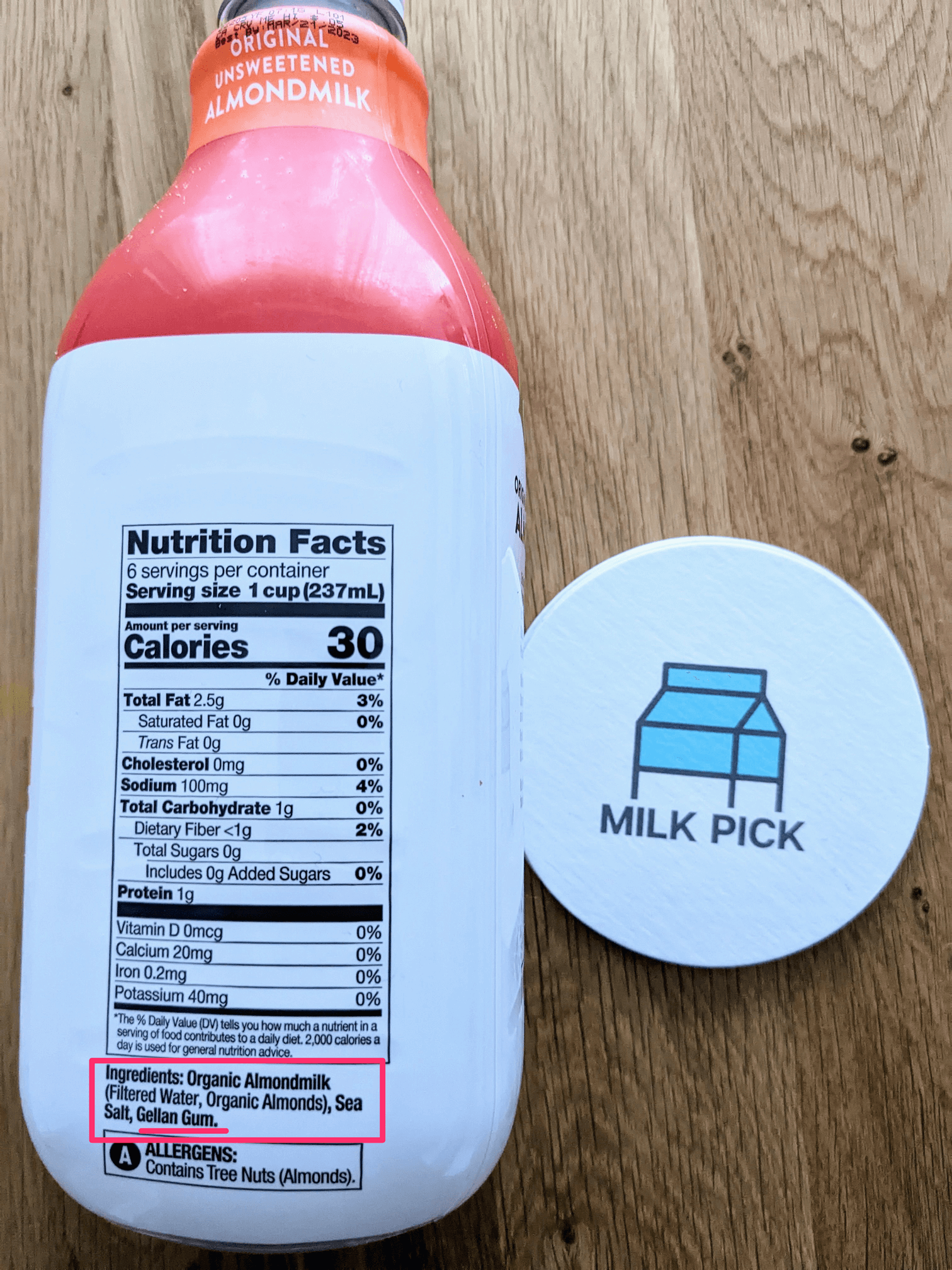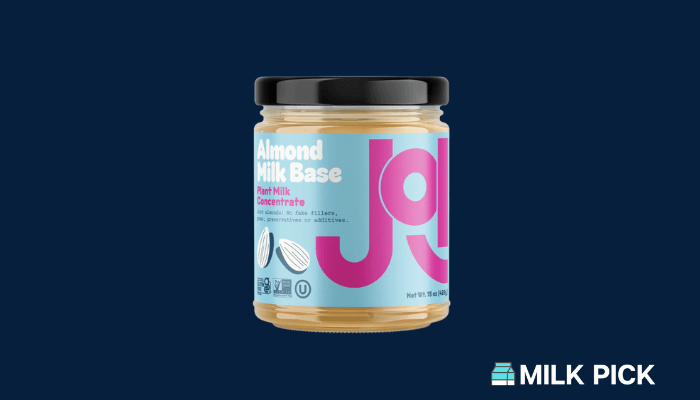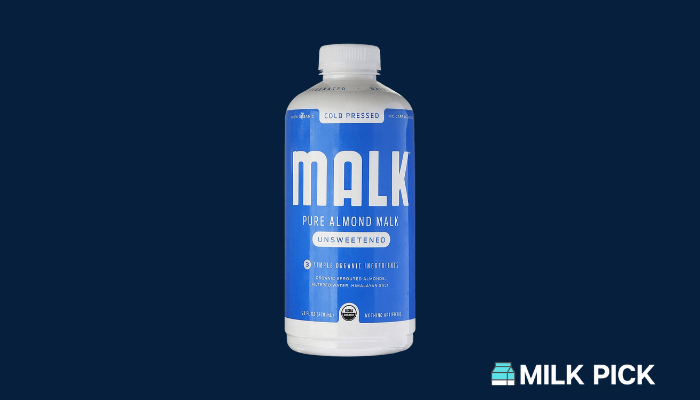When you buy a container of almond milk from the store, you may notice a few unfamiliar ingredients on its label.
One ingredient that many store-bought almond milk brands put in their product is gellan gum.
Gellan gum is a common additive that binds and thickens many processed foods.
So, why is it so common in plant-based milk and is it safe to consume? Read on to find out.
What is Gellan Gum?
Gellan gum is a gel-like food additive that manufacturers use to stabilize, bind, or texturize their products. It's similar to agar agar, guar gum, xanthan gum, and carrageenan in thickening and emulsifying food products.
Many cold-food manufacturers prefer gellan gum because it works well even in small quantities and isn't prone to heat sensitivity.
Gellan gum is found in nature.
It grows on plants like water lilies, but most food producers use a manufactured type of gellan gum made by fermenting sugar with the S. paucimobilis bacteria, making it a microbial exopolysaccharide.
Gellan gum is plant-based, and it is a preferred alternative to animal-based gelatin for vegan products.
Uses For Gellan Gum
Gellan gum is used in foods and pharmaceuticals for its gel-like properties.
Adding gellan gum to food can help provide a creamy or jelly-like consistency. It also helps make certain foods less subject to melting, stabilizing the ingredients.
When added to plant-based milk like almond milk and juices, gellan gum works with supplemental nutrients, such as calcium or Vitamin D, to prevent the ingredients from separating and settling at the bottom of the carton.
Gellan gum is typically found in the following foods:
- Fruit and vegetable products like jams, purees, and dried variations
- Drinks like juice, chocolate milk, and plant-based milk
- Sweets like baked pie fillings, gum, marshmallows, and candy
- Dairy products like yogurt, cream, and milk
- Packaged foods like noodles, bread, and cereals
- Sauces and condiments like mustard, ketchup, broth, and syrup
Why Do Almond Milk Companies Put Gellan Gum In Their Product?
Many almond milk brands put gellan gum in their products to keep them shelf-stable, maintain consistency, and prevent separation.
Prevent Separation
Raw almonds are blended with filtered water when almond milk is made at home or by a manufacturer.
The mixture is strained to remove large pieces of almond pulp, and the rest is placed into a container to drink.
In homemade almond milk or store-bought almond milk without an emulsifier, almond particles may separate, leaving you with a layer of almondy water on top and thicker particles on the bottom.
This is similar to what can happen with other plant-based milk, like oat milk.
Manufacturers use gellan gum in almond milk to act as an emulsifier, keeping the water and almond particles suspected in a thicker, creamier mixture.
Gellan gum also keeps other elements, such as added nutrients like calcium, emulsified in the beverage, giving you a more stabilized final product.
Stabilize Temperature
Store-bought almond milk companies also use gellan gum to help stabilize the product if it goes through temperature shifts.
The gum helps keep your almond milk in a safe-to-drink condition under small changes in temperature.
For example, if you buy almond milk and it begins to heat up on the drive home from the grocery store, gellan gum can help minimize spoilage and separation for small amounts of time.
Is Gellan Gum a Safe Additive?
Gellan gum is generally considered a safe food additive.
The FDA has approved gellan gum for use in food products and states that it's non-toxic in animals and humans.
A 2018 re-evaluation of gellan gum found no toxicity or carcinogenicity in the ingredient and no adverse side effects in people who consumed up to 200 mg per kg per body weight for three weeks.
However, a 1997 study on rats found that gellan gum coated their digestive tract, slowing digestion.
Additionally, a study on gellan gum in humans found that the additive worked as a fecal bulking agent and slowed digestion.
It also increased bile acid concentrations in their stool from .69 to .83 mmol/24 hours in women and 1.22 to 1.44 mmol/24 hours for males in the study.
Why Avoid Gellan Gum In Your Almond Milk?
The research on gellan gum shows that as an individual additive, gellan gum causes few digestive issues in most people, so why avoid it in your almond milk?
The most significant reason to opt for almond milk without gellan gum is that typically when an almond milk company uses gellan gum, it's because there are other additives in the beverage.
It's not the gellan gum itself that is the issue; the other ingredients in the almond milk that accompany this gum can cause problems.
For example, gellan gum may be used with carrageenan, oils, or sweeteners that can cause health issues.
Carrageenan, in particular, comes with important questions regarding safety, and some research shows an increased risk for digestive problems for those who consume this emulsifying agent.
A 2018 review of gellan gum found that while the exopolysaccharide is non-toxic, it doesn't always hold together at high pHs and has a small temperature window.
These characteristics mean that gellan gum is often blended with other polymers, such as:
- Cellulose
- Pectin
- Agar
- Polyvinyl chloride
- Xanthan gum
- Chitosan
- Sodium Alginate
- Pullulan
This mixing of polymers with gellan gum means you may not always be getting non-harmful gellan gum alone in your almond milk; rather, you may take in other ingredients that aren't as safe.
If you have any type of digestive issue, you may also suffer from the bulking problems that gellan gum can cause in large quantities.
For example, if you have ulcerative colitis, Crohn's Disease, or IBS, you likely want to choose almond milk with as few extra additives as possible.
How To Tell If Your Almond Milk Has Gellan Gum
To tell if your almond milk has gellan gum, look on the back or side of the container on the FDA-required nutrition label.

If the label says gellan gum or E418, it contains at least a small amount of the ingredient. It may also be sold under brand names like Kelcogel or Gelrite.
Should You Completely Avoid Gellan Gum?
Deciding whether or not to avoid gellan gum depends on your dietary preferences and health.
Gellan gum on its own is unlikely to cause issues, but its presence usually indicates other additives in the beverage.
While additives like gellan gum may not be inherently harmful, fewer synthetic ingredients generally result in fewer digestive or other side effects.
If you have a sensitive system or are trying a diet like Whole30 to identify foods that cause your body issues, it may be beneficial to avoid almond milk that contains gellan gum.
Many store-bought brands of almond milk contain gellan gum, so it's best to opt for a product that you make yourself or that uses simple, natural ingredients.
You can make almond milk at home using raw almonds and water or a convenient almond base like JOI with no additives.

If you can afford the price point, almond milk, like Elmhurst 1925, MALK, and Three Trees, offer refrigerated and shelf-stable almond milk without gellan gum or other additives.

Bottom Line
Gellan gum is an additive many almond milk companies use to emulsify their product to give them a smooth texture.
Several studies since the 1970s have shown gellan gum to be a safe additive for human consumption.
Minimal evidence suggests slowed digestion in some people after ingesting gellan gum, so you may want to limit your intake if you already have digestive problems.
On its own, gellan gum is mostly harmless, but it does indicate that your almond milk likely contains more additives.
These additives can interfere with a clean eating plan or cause further digestive issues.
